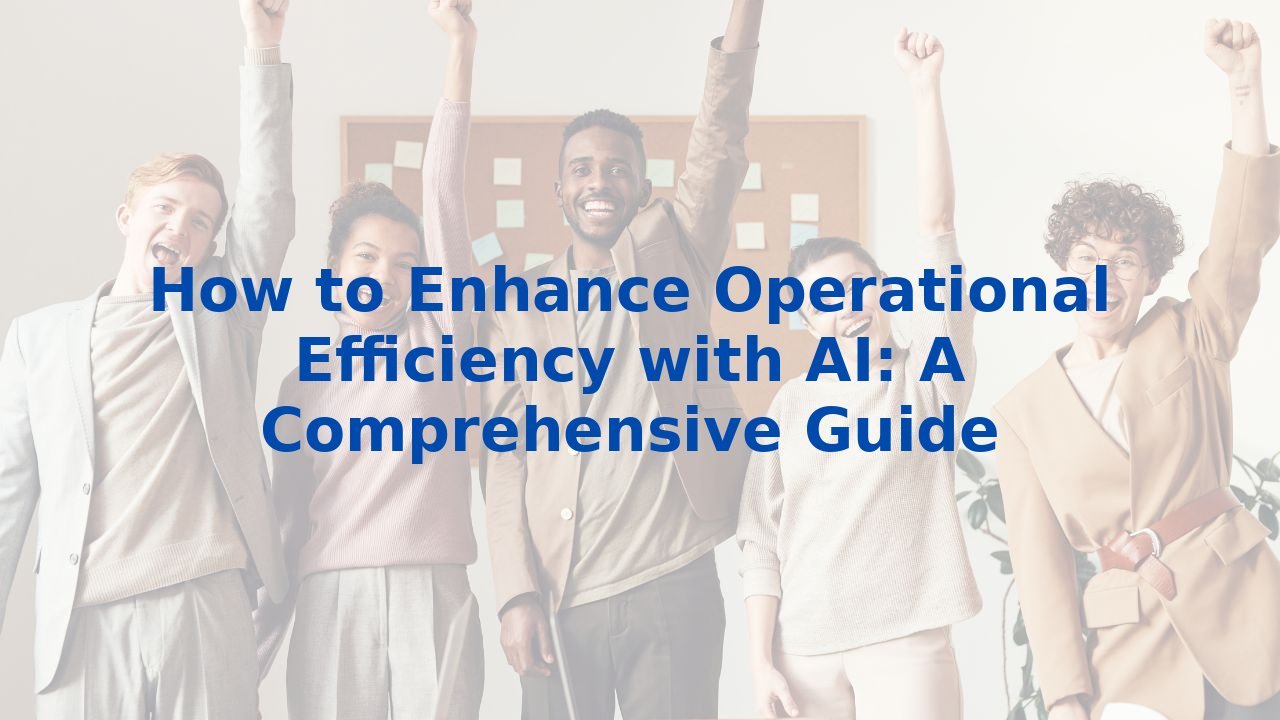How to Enhance Operational Efficiency with AI: A Comprehensive Guide
How to Enhance Operational Efficiency with AI: A Comprehensive Guide
In the current landscape of business, operational efficiency isn't just an advantage—it's a necessity. With rapid technological advancements, particularly in artificial intelligence (AI), organizations have a unique opportunity to redefine their operational capabilities. This guide explores how leveraging AI can streamline processes, automate tasks, and empower organizations to maximize their efficiency.
Understanding Operational Efficiency
At its core, operational efficiency revolves around maximizing productivity while minimizing waste and errors. It goes beyond simple task management; it involves optimizing workflows, automating repetitive tasks, and utilizing data to inform decision-making. Traditional methods of achieving operational efficiency often lean heavily on manual processes, which can be labor-intensive and laden with the potential for human error.
The Role of AI in Enhancing Operational Efficiency
Artificial Intelligence is a transformational force that can dramatically enhance operational efficiency. Here’s how it can reshape various business processes:
- Automation of Repetitive Tasks: AI excels at automating mundane tasks such as data entry, customer inquiries, and inventory tracking. The result? Employees can redirect their focus toward strategic and creative activities that drive growth.
- Predictive Analytics: By analyzing historical and real-time data, AI can forecast trends, pinpoint potential bottlenecks, and proactively address challenges. This foresight not only helps in minimizing downtime but also optimizes resource allocation.
- Process Optimization: AI algorithms scrutinize existing processes to identify inefficiencies. By implementing targeted optimizations, businesses can lower error rates and streamline operations for better overall results.
- Data-Driven Decision Making: AI empowers organizations to harness large volumes of data, providing actionable insights that enhance overall performance. Making informed decisions becomes easier and quicker, resulting in improved customer experiences and resource utilization.
Benefits of AI for Operational Efficiency
The integration of AI technologies into business processes brings a wealth of benefits:
- Enhanced Productivity: By automating routine tasks, organizations witness a significant boost in employee productivity and innovation.
- Cost Reduction: AI can drastically minimize time and resources spent on tasks, resulting in substantial financial savings.
- Improved Accuracy: Leveraging AI models ensures precision in data processing, reducing human error and enhancing decision quality.
- Scalability: AI solutions can handle increased workloads without the necessity to scale human resources proportionately.
- Agility: Organizations can quickly adapt to market fluctuations, maintaining a competitive edge through AI's rapid processing abilities.
The Importance of Training Employees for AI
While AI can drive significant improvements in efficiency, its potential is maximized only when employees are equipped to engage with AI technologies effectively.
- Understanding AI Capabilities: Employees need to grasp how AI functions to seamlessly integrate it into their workflows. This includes demystifying machine learning, natural language processing, and more.
- Data Analysis Skills: Understanding data analysis allows employees to interpret the insights provided by AI systems, fostering a data-driven culture.
- Adaptability and Flexibility: As AI evolves, so too must the skills of the workforce. A commitment to continuous learning allows employees to stay ahead of the curve and fully leverage new capabilities.
Implementing AI for Operational Efficiency
Integrating AI into your operations is a multi-step journey. Here’s a structured approach:
- Assess Current Processes: Identify workflows where automation can yield substantial benefits, examining processes with a critical eye for bottlenecks and inefficiencies.
- Choose the Right Tools: Select AI solutions that align with your organizational needs. This step is crucial for ensuring a successful AI implementation.
- Train Employees: Invest in comprehensive training programs to equip your workforce with the essential skills for operating AI tools effectively.
- Monitor and Adjust: Continuously evaluate the impact of AI on operational efficiency. Gathering feedback and tracking performance metrics allows for the fine-tuning of processes and strategies.
Conclusion
AI is redefining operational frameworks by enhancing efficiency, productivity, and cost-effectiveness. By automating tasks, optimizing workflows, and harnessing data-driven insights, organizations can transform their operations to meet today's fast-paced market demands. As a pivotal element in this transformation, effective employee training ensures that businesses unlock the full potential of their AI investment, paving the way for unparalleled operational success.
If you're ready to equip your workforce with the AI skills needed to thrive in this new era, consider exploring more resources and training options available to you. Committing to an educated workforce ensures that your organization not only survives but flourishes in a technology-driven future.



